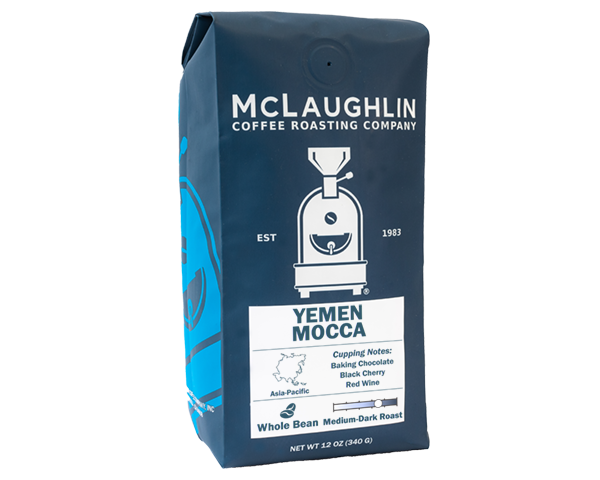YEMEN MOCCA
Yemen Mocca has an incredible fruity aroma as it brews. This coffee has a balanced acidity and a light body. The cup starts with sweet black cherry acidity and chocolate. As the acidity fades, the characteristic Yemen winey flavors develop and they linger into the chocolatey dry finish. This is a unique coffee that will appeal to some, but not certainly not all.
Roast Color: Medium
Cupping Notes: Baking Chocolate, Black Cherry, Red Wine
Story: This coffee is produced by legacy farmers of various sizes in the high mountains of Sa’adah and Ibb Governorate. Coffee-growing families in Sa’adah and Ibb, similar to many others across the country, tend parcels of terraced land passed through many generations. Coffee is the one crop that continues to survive above all others, both for the livelihood it provides, as well as being a deep social tradition that keeps communities together. Yemen is the oldest territory on Earth to cultivate coffee. Its seed stock, originally transported from wild arabica landraces in Ethiopia, was used to create the world’s first ever coffee farms where coffee would be grown commercially for trade across the Arabian peninsula and eventually mainland Europe. (“Arabica” itself referred to the Arabian coffee supply that was the West’s first in history.)
Maintaining coffee trees in a climate as dry, high, and uniquely challenging as Yemen’s western and northern ranges, requires the kind of proven techniques that only generations of farming can bestow. Coffee farms are terraced on arid, incredibly steep slopes. Bore holes are dug manually into the rock to access individual water reserves for each tree wherever rain is scarce. Coffee trees are spaced generously, about 1000 per hectare (compared to 4000-6000 common in Latin America), both by necessity on the narrow terraces, as well as for better groundwater access and erosion control. Raising young coffee trees is a matter of hardening them for a lifetime of vicious elements and water scarcity. Older coffee trees become very spacious and tall, and often end up hanging their branches over the terrace edge, known locally as “hanging gardens”. Above the coffee, shade trees are carefully selected and positioned for how well they block water evaporation. As can be imagined, productivity is very low in such conditions. And still, over one million people work in Yemen’s coffee trade, from farm to export
Yemen’s ongoing civil war has not stopped the Muslot family and Pearl of Tehama from dutifully managing and exporting the coffee harvests of the farms and families they represent; something they can be very proud of given the conflict’s overwhelmingly ruinous effect on much of Yemen’s international trade. Not only this, but Pearl of Tehama has established a consultancy for other service providers in coffee, particularly exporters, to help expand Yemen’s coffee sector safety net and even increase the coffee’s availability and competitiveness abroad. Consulting covers the management of traceable harvest information, preparing technical reports from the field, correspondence with farmers and customer relationship management, harvest and processing calibration, and more. The guiding mission is to increase potential at both ends of the value chain: more available quality coffee from throughout Yemen’s historic producing territories; and greater buyer appetite all over the world thanks to expertly managed, traceable coffees being marketed.
This Viennese roasted coffee is a perfect example of what a roast profile can do for single origin beans. The first time I had this coffee, close to 30 years ago, I knew it was something special.
For preparing it, I stick to pourovers as pulling espresso shots with this seems to hide the complexity.
I think just for fun I should add that (as a craft roaster) I roast my coffees to full city + and have no shortage of beans to choose from. McLaughlin Roasters’ Yemen Mocca is my roast-of-choice for daily drinking.
The bag of this coffee that we received was oily and obviously overroasted. The flavor of the beans had been roasted away.
This coffee is my daily morning coffee when it's available. The flavor is rich with a unique palette that I can't find anywhere else. These tiny, water-starved beans make it from the harsh environment of its origin to the US and get a very fine roasting treatment from McLaughlin C.R.Co.
When I serve this to guests they are surprised by the uniqueness of the scent and flavors. When I bring this on business trips and prepare pour-overs for my associates after lunch it never fails that they to know where I get my beans. Most notable is the scent. Opening the container is the first hint that there is something special here.
The fresh ground fragrance is thick with spices that evoke a feeling of walking through a souq on a hot afternoon with a lingering sweetness and surprising cabernet muskiness I've never found in any other coffee. The flavor has a distinct origin profile with a toasted, rounded finish you'd expect from the roast profile.
As a person who has enjoyed Yemeni coffees for the past 25 years, I can solidly recommend this if you want a bold experience from grind to cup.



